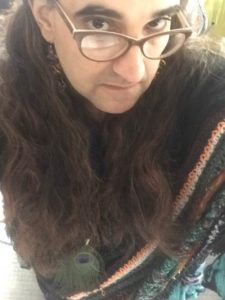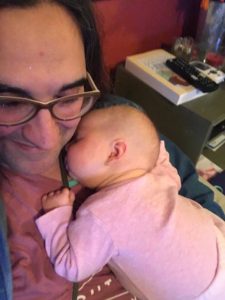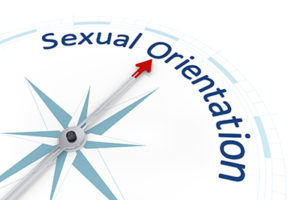Posted by Jennifer Angelina Petro on Monday, March 16, 2020
Category Archives: Transgender
Jenn, the Fairy TransMother talks about Monsters and Reads Some Books for Kids
Jenn, the Fairy TransMother talks about Monsters and Reads Some Books for Kids
Posted by Jennifer Angelina Petro on Tuesday, March 17, 2020
I am Trans Enough, Fuck the Gatekeepers, An EFT Tapping Session, by Jennifer Angelina Petro
An EFT Lovingkindness Meditation–The No-Explanation Version, by Jennifer Angelina Petro
The Transgender Lovingkindness Meditation, the No-Explanation Version, by Jennifer Angelina Petro
Silly Geese and Momma Bears: A Playful Look at So-Called Gender Differences, By Jennifer Angelina Petro
Silly Geese and Momma Bears:
A Playful Look at So-Called Gender Differences
By
Jennifer Angelina Petro
The following is a light-hearted (yet with deadly serious ramifications—especially in today’s world) look at the fallacy of so-called gender identifiers and the even more illusionary “characteristics” of gender as perceived by people (henceforth referred to as Silly Goose, or SGM for “males;” SGF’s for Silly Goose “females,” (sorry to use the tired binary system—it’s just for the sake of this post); and I will refer to them collectively, as Silly Geese, or SG, for short) who
1). Believe there are only two genders— “male” and “female,”
2). Believe that the only two genders are “opposite,”
3). Believe the two genders can ultimately be defined by genitals and personality traits.
It should be pointed out at the onset that I too am a Silly Goose Female, but of a much more pleasant, fabulous, and glittery variety.
Some of what is said in this little romp are actual statements people have made to me (henceforth referred to as Fabulous Unicorn Glitter Rainbow Queen, or FUGRQ for short) while trying to disprove my existence a transwoman.
Please note: any information herein is meant to be humorously educational and if it offends may you be nibbled to death by gazelles. And now back to the exchange.
SGF: How do you know you’re female?
FUGRQ: How so you know you’re female?
SGF: I asked you first.
FURGQ: And the first shall be last. We’ll get to my answer later.
SGF: There are clear-God-ordained differences between males and females.
FUGRQ: That’s an opinion, but back to my question.
[Please note I am not going to use quotation marks around words like, “male,” “female,”” tough,” or “womanly,” for the remainder of this post. I realize I just did, but that was purely for example’s sake. The overuse of quotation marks dampens their otherwise enormous powers of making sure you understand what I “actually” mean. I have the fullest confidence that your brain will automatically insert quotation marks around the words that need them, thus saving me from having to hit “shift,” before hitting the quotation mark key. Damn.]
SGF: Well, I just feel…womanly.
FUGRQ: OK. What does feeling womanly feel like?
SGF: It feels…feminine.
FUGRQ: What does feeling feminine feel like?
SGF: Well, I feel nurturing as a female.
FUGRQ: Have you ever met, seen, or interacted with a nurturing male?
SGF: Um…. yes, I suppose.
FUGRQ: Then the quality of being nurturing is a genderless quality?
SGF: Well, female nurturing is softer and gentler.
FUGRQ: Ever heard of Mr. Rogers? Or, Bob Ross, or, say: Jimmy Stewart?
SGF: There are exceptions, yes.
FUGRQ: Those exceptions are actually proof that being nurturing is a genderless quality, and thus cannot define gender. Give me another example.
SGF: Females are more emotional than males, they cry more easily.
FURGQ: Ever heard of Cal Ripken, Lou Gehrig, Jon Stewart, Abraham Lincoln? They all cried, as did many a Philadelphia male when the Eagles won the Superbowl.
SGF: As I said, there are exceptions—some males are more sensitive than others.
FURGQ: Those exceptions are actually proof that being emotional, or crying easily, is a genderless quality and thus cannot define gender.
Here is a conversation between an SGM and myself:
SGM: How do you know you’re female?
FUGRQ: How do you know you’re male? What is your inner experience of that like?
SGM: Well, I feel…masculine.
FUGRQ: What does that feel like?
SGM [puffing out chest]: Well, I feel manly.
FUGRQ: OK, what does that feel like?
SGM: [unable to keep chest puffed out more than a few seconds, it sinks back to regular chest settings]: Well, I’m a protector of children.
FUGRQ: Ever heard how mother bears protect her cubs, or how Sojourner Truth or Mother Theresa protected children, or how Pink protects her children?
SGM: Well, there are exceptions to the rule.
FUGRQ: Rule? You’ve just seen that being protective is a genderless quality.
SGM: Well, I know I’m male because I’m tough. [SG puffs out chest again.]
FURGQ: Well, what about the aforementioned mother bear, or the likes of Kathrine Switzer, Venus and Serena Williams, Rosa Parks?
SGM: As I said, there are exceptions to the rule [chest sinks back in].
FURGQ: It boils down to toughness—physically and mentally—is a genderless quality, and therefore cannot define gender.
SGM: Whatever.
FURGQ: So then, what is the actual difference between males and females?
SG: Here’s proof of the difference between males and females you can’t dispute—males have a penis and release sperm and woman have a vagina and release eggs.
FURGQ: So, it comes down to body parts?
SG: Yes. You can’t deny that one.
FURGQ: What about sterile males and infertile females are they still males and females?
SG: Those are disorders.
FURGQ: But you still consider them as defining characteristics of male and female?
SG: Yes, of course.
FURGQ: So, then, ultimately bodily functions can’t define gender. What about intersex people or the so-called-not-really-used-anymore-word: hermaphrodites?
SG: Again, there are exceptions that are considered disorders.
FURGQ: Hmm. What if a male loses his penis in a horrible accident or a woman has her vulva damaged in some way? Is the male still male or the female still female?
SG: Yes, because accidents happen.
FURGQ: I’ll give you that both sperm and egg are required to make little humans, but those ingredients can produce both little male and females, isn’t that interesting? And just because sperm come from one type of body and eggs from another doesn’t actually make two genders—it makes differently made bodies. Both have arms, legs, eyeballs, ears, toes, and so on. You’re saying the ONLY body parts that define males and females are genitals and their bodily functions?
SG [smugly]: Yes, that’s the truth.
FURGQ: OK, well, we’ve seen that either body can have different genitals, so, when it comes down to it, bodies don’t explain the inner experience or the feeling of being male or female. Despite bodily varieties there is no actual way to define what it feels like to be male or female.
SG: Yes, that’s what we’re saying. We just KNOW.
FURGQ: And so, you go around KNOWING you’re males and females because you’re constantly—so-to-speak—feeling your genitals?
SG [looking at one another then turning back to me]: No, not necessarily.
FURGQ: So, genitals do not make you experience on a soul-level-a consciousness level, that you’re male or female?
SG: We suppose not, but still…
FURGQ: Still what?
SG: Feelings and inner experiences are subjective and not necessarily true.
FURGQ: Really, so your inner experiences don’t count either?
SG: Well, it’s in the Bible.
FURGQ: Ah, I wondered when that book would eek into the conversation. There’s no way for me to really argue with people who believe that one book—out of the gazillion books ever written—is the whole truth and nothing but the truth despite science, and verses like Isiah 53: 3-5 where God says eunuchs shall be given names greater than men or woman? Or how Jesus treated everyone as if their gender didn’t matter in the least?
SG: Never heard of the Isiah passage.
FURGQ: Ah. What about Jeremiah 1:5? If you deny an infinite variety of bodies exist, then God must make mistakes. You must believe people born blind or short or tall or deaf are mistakes.
SG: God doesn’t make mistakes. People born handicapped are due to human genetic abnormalities.
FURGQ: I prefer the term, “differently born,” because that includes everyone—since we’re all born with different bodies. But aren’t those genetic issues ordained by Divine Providence?
SG: Now we’re getting into theological debate, and there’s no sense in that.
FURGQ: Agreed. Disputing the Bible’s so-called infallibility is futile, not because it’s right, but because your minds are indoctrinated with what you believe to be true, and everyone knows that beliefs aren’t facts.
SG: The Bible is God’s actual word.
FURGQ: As I said, there’s no way I can argue with your ingrained beliefs, I shouldn’t have tried, so let’s return to the human body, which you so ardently believe defines a particular gender.
SG: OK. Let’s. Everyone knows females don’t have facial hair or deep voices or adam’s apples.
FURGQ: On the contrary , there are females with beards and facial hair of varying amounts, plus most other mammals, like the afore-aforementioned bear–no-matter what genitals it is born with–have hair (well, fur). So then, body hair is a genderless quality and can’t define gender. And by the way, I wouldn’t go around asking bears to spread their legs so you can think you’ve decided what gender they are based on what you find.
SG: OK, fine, but what about the male’s deep voices or adam’s apples?
FURGQ: What about Mae West, Kathleen Turner, Angelina Jolie? They have deep voices.
SG: There are exceptions too.
FURGQ: At the end of the day, the sound and timber of someone’s voice does not define male and female. And as far as the adam’s apple, anyone can have one. Just because some bodies have bigger ones than others doesn’t make theirs’ male and the other female. Sandra Bullock, Meg Ryan, and Halle Berry can all be said to have large adam’s apples.
SG: Well, females can nurse babies and men can’t.
FURGQ: We’ve already seen that body parts do not define gender itself—they may be associated with bodily functions and made-made words—but those words and functions referring to various body parts don’t define gender. It’s what’s inside that counts—the inner experience or feeling of being the gender you know yourself to be. So, I will ask my original question: What is your inner experience of being a particular gender—not reliant on the outer forms of the body? What does it feel like to be who you are?
SG: We just know, that’s all. We just know.
FURGQ: And that’s my answer to your original question. I told you we’d get to it eventually.
SG: Whatever. We won this little debate [the SG’s walk away with their chests puffed out and their chins pointed high].
“Love your neighbor as yourself,” I call out as they strut away, but they are too far out of range to hear, which would be the case no matter the distance from where we stood.
Dissociation and Presence-The Transgender Day of Remembrance 2018 By Jennifer Angelina Petro
Dissociation and Presence
The Transgender Day of Remembrance, 2018
By
Jennifer Angelina Petro
I realized after the Transgender Day of Remembrance Service that I helped organize and lead at Love in Action UCC, I began to dissociate. It was a beautiful and yet heavy morning. Try as I might my brain just couldn’t stay present with the pain. PTSD triggered, I tried to feel the tragedy of so many innocent lives lost, yet my soul said: “It’s too much. Feel what you can now, then feel more later, and remember Dear One, you do not need to sit with the pain alone.” I did my best to not shame myself for needing a space between the pain and consciousness. I went home, collapsed into bed, and within minutes I was weeping, and then, like a baby being held in her mother’s arms, I slipped away into a holy nothingness. Later in the evening I had the honor of holding a baby in arms as she slowly drifted into sleep. I sang to her as softly as the wind, I matched the rhythm of her breathing, I swayed gently, like a tree holding the moon, and I knew at that moment—allowing myself to experience pain and grief in however I need to—even if that requires a sleep of nothingness, I will not judge myself as weak. I will acknowledge my soul’s wisdom for taking my wounded heart into her arms and singing to me as softly as the wind, for matching the rhythm of my breathing, and for swaying gently, holding me, as a tree holds the moon. ❤️
Remembering the Storm, And Putting the Box Cutter Down, By Jennifer Angelina Petro
Remembering the Storm
And Putting the Box Cutter Down
By Jennifer Angelina Petro
Two years ago today, I stood at the threshold of the doorway to my basement apartment with a box cutter held to my wrist. I paced. I shook. I wept. I was filled with fear. It was cold. A light snow was falling. I felt utterly alone. It was the first fall I wasn’t teaching after twenty years. Other loses as a result of coming out as trans weighed heavily on my chest. The last school year I taught was devastating—aside from the most amazing and accepting students ever. The rest of it was traumatic. Now, I couldn’t find a job, and I missed teaching with all my heart and knew I would likely never teach elementary school again.
I stepped out into the snow. It drifted down gently on my shoulders. I was in my pajamas. No coat. No shoes. My socks were wet. My feet freezing. I pressed the blade against my wrist daring myself to end my life. Visions of collapsing right there in front of my door seeped into my mind—a mind broken—cracked—frantic. I stood there wondering who would find me. I feared for their hearts. I hoped the Divine would have mercy on my soul. Ending my life wasn’t a conscious choice. I was compelled by searing pain, depression, and the terror of a dark, uncertain future.
And then it happened. I closed the blade back into the box cutter. I went in and got my keys. I was drenched with snow, shivering. I put the box cutter down on my unmade bed. I looked around at the piles of dishes in the sink, the clothes strewn upon the floor, the plants unwatered, and, weeping even harder, reaching down for the box cutter again, only to drop it back on the bed. I forced my wet feet into my slippers, and went back outside.
The wind was wishing me onward. The snow slanting at an angle gesturing to my car. And I followed. Angry and frightened, disappointed in myself for ruining my life, for allowing myself to get this sick, wiping the snow from the windshield with my bare hands, unable to see what a courageous step I was taking. Unable to see the unseen forces of strength that were being obeyed by some part of my spirit that wasn’t sick—that deeply wanted to live—caught in a blizzard of mental illness. And I drove myself to the hospital.
When I got there, I gave my keys to a valet parking attendant—they stared at me. I must have looked wild—a scared animal—unshaven, sopping wet, snow-soaked. I walked into the emergency room and up to the counter.
“How can I help you Hun?” the nurse asked.
And I found myself, still weeping, snot falling, saying: “I’m going to kill myself.”
“Step around here,” she said, and they immediately brought me into a private room. Nurses gathered around me. They called a doctor. They gave me a gown and a warm blanket. They stationed someone outside my room to watch over me. The nurses were like angels—quiet, soothing, present, efficient.
I would spend the next ten days in the psych ward, missing Thanksgiving with my family. But I was alive. Somehow, I had survived a wave of mental illness.
The storm wouldn’t end there. I had more hospital stays and worse bouts of suicidality a month after leaving. For that moment though, I was safe from the sickness. I was surrounded by care.
The last thing I remember thinking as they injected tranquilizers into my IV, was: “Help me.”
Today, two years later—much more stable, and yet still struggling daily with passive suicidal thoughts and other forms of mental illness, those memories are falling like the snow, blanketing my heart. I watch the snow covering the trees with meticulous attention. I remember standing out in the snow holding the box cutter. I remember the depth of pain, fear, and depression—the echoing hopelessness. I remember feeling completely alone. I remember turning back, putting the box cutter down, picking up my keys, and walking, unsure, terrified at how sick I had become, out to my car.
All donations from this post go to Trans Lifeline.
I Think I Might be Straight? My Ongoing Journey of Discovering My Sexual Orientation, By Jennifer Angelina Petro
I Think I Might be Straight?
My Ongoing Journey of Discovering My Sexual Orientation
By
Jennifer Angelina Petro
CW: Description of Dysphoria; mention of sexual abuse; open references to genitalia; mention of gender-affirmation surgery; a couple sexually explicit words; allusions to sexual acts
- Dysphoria—Getting Current
As of the writing of this post—November 5th, 2018, I am struggling with a nasty bout of dysphoria. Haven’t had one this bad in a while. In this moment—sitting on a big, round, fluffy, pink pillow on the floor of the living room, writing this, it’s six-eleven P.M. It’s dark, rainy, chilly. The autumn leaves are shining with their true brilliance. And I am sitting here alone, weeping quietly. I want a vulva so badly—my heart hurts. My guts are churning. My whole body feels wrong. I know—I have an interestingly-penis-shaped vulva. I know—it’s not the parts that make the person. I am a woman no matter what my genitals look like. I am a woman because I am—not because I take estrogen—not because of how I dress or act or speak. I am a woman. Enough said.
And yet—here I am, sitting on the floor—experiencing this strange sensation in my genitals—it’s a sort of longing to be something else—it’s visceral. The feeling extends up my sides, branching to my arms and shoulders, and my shoulder blades ache as if wanting to sprout wings. The rain-stained darkened window reflects my face—it looks as if I’m melting. My heart contracts and pulls my sense of self inwards a little further—a little more away from the world, and the tears withdraw inside, and my eyelids feel heavy, and my spirit wilts like a rain-soaked weeping willow. My genitals seem to remember another time—perhaps another lifetime even—I don’t know—but another time, when they were right with who my spirit is—when they radiated warmth, the darkness of a pond, the beauty of a flower, and the power of the moon.
And so, I sit, type, share what many think is way too much information. I know I wax poetic—fuck you—I’m a poet. Thing is, the very next moment after the blessed revelation that I’m a woman over three years ago—the very next moment—I wanted gender affirmation surgery. It didn’t faze me as to why I had such a desire. It simply needed to happen. Having no frame of reference in any way to such a surgery—the palpable desire to adjust this body more to what would ease this intense longing—that would help me feel more me—wasn’t even surprising. It’s as if it was always there—hidden inside, and that’s because it was. And it is all a holy mystery.
I think this wave of dysphoria has to do with where I am on my journey to awakening to my sexual orientation. The more I think I’m straight—that I really like guys—the lonelier I feel—the more impossible life feels. I want to be made love to with every fiber of my being by a man. I want to feel a cock inside me. It’s just the truth, and it will never happen. Nor will I ever have a child or nurse a baby. These are painful truths I live with every day. Some days hurt more than others. Today is one of the days it hurts like hell.
2. Questions About My Sexual Orientation
After I came out, the second most frequently asked question (after: “Have you had the SURGERY?”) from people was (and often still is): “Are you lesbian? I mean, you were married to a woman for twenty-three years. So, um, like…you’ve got to be a lesbian, right?”
When I first had the blissful christening of being transgender, I assumed I was, in fact, a lesbian, for exactly the reasons people mentioned. It made sense.
Then, about a year in, I was ordering some fries from Five Guys and the cashier was an incredibly handsome young man, and I found myself swooning in a way I’d never done before. I could barely speak. My knees were shaking. My hands fumbled as I gave him my crinkly cash and took the receipt hoping we would make some electric, albeit brief finger to finger contact. I knew if we did, I might faint.
Alas, it didn’t happen. I stepped aside to wait for my fries while compulsively munching on the free peanuts they give out. I admit I kept stealing looks at him. I hoped to god he couldn’t see my eyelashes batting like hungry butterflies.
I was stunned. It was the first time in my life I consciously had an attraction to a man. I left the restaurant and pondered in my heart what this encounter meant.
I’m a lesbian, right? Or am I bi?
I went home and conjured up some sexual-fantasies to see what felt better, so to speak, when imagining myself being sexually intimate with someone. And while I could feel twinges during reveries with the traditional images of men and women, the one that made me the horniest was thinking of making love with a man, and of doing various things to a man I suddenly always wanted to do. Once again, I was stunned.
And luckily, I wasn’t worried one way or the other.
Growing down (as opposed to “growing up”) I was forcibly “masculinized,” by my parents and other adults in my life. They saw something “effeminate,” in me and wanted it gone. After years of a steady diet of porn supplied by my parents it had seemingly “worked.” I thought for sure I was a straight guy even though I would have to confess to myself that when the porn I looked at/watched involved a man and a woman, I was often most fascinated by the guy and their “money shots.” I didn’t know why and I certainly didn’t encourage it by seeking out relationships with guys. I was steeped in an environment of homophobia and I had my own. I can see looking back that I also had an internalized misogyny, and, if I would have had a word for it in my unconscious awareness of being trans, I would have experienced an internalized transphobia as well. Not to mention dysphoria. Add to all that sexual abuse of all kinds, Catholic guilt over masturbating, as well as my own warped inner attitudes and desires around sex, and I wasn’t only confused, but ashamed—steeped in self-hatred.
Over time, after coming out, I started feeling the urge to date. Hadn’t dated in over twenty-five years. Time to get back in the game. Time’s a-ticking. I joined a couple dating sites. I proudly announced I’m trans and proceeded to write what amounted to an entire autobiography as my profile. It’s no wonder I never had any takers. No one had time to read such a tome.
I marked that I was lesbian. I marked to only have women see my profile. Nothing.
After a while, it seemed right that I was actually attracted to everyone in the gender galaxy (to hell with the spectrum idea—gender is an infinite multiverse). So, I switched my profile to “pan,” and happily proclaimed on FB that I was pan—bought the pan flag, and some pan-buttons, and well, yeah, being pan felt right. It seemed to encompass the whole kit and kaboodle.
And yet the people I found myself most attracted to were female-identified and/or presenting individuals. Maybe I was lesbian after all. Or maybe I’m pan with a little leaning towards women. Here again, I am happy to report that these confusions didn’t disturb my sense of self. It was an adventure. It was exciting. And yet, I believed it ultimately didn’t matter anyway because no one would ever want to date me let alone be sexual with me. That being said, it was all still fun to discover, if at least on my own, who and what made me horny. I longed to be sexual with someone the way I am now—fully cognizant of being a woman. I simply wanted to know the truth of who I am and share that truth with someone else.
I get it, labels mean little. I like them sometimes though. Like when I finally was diagnosed with being bi-polar. I found that strangely comforting. Same with being trans. Moving along a journey of discovering (uncovering?) my sexual orientation, I liked when I found names—labels. They were like sign-posts pointing to buried treasure. They don’t define me, they just help me understand myself.
Fast forwarding a bit, I’m not sure if it was the orchiectomy or my abusive past, or because I was resigning to never being sexual with anyone ever again—or because I simply was that way because I was—there needn’t be a reason—but I began to wonder if I was asexual. After much research, it seemed to fit. I no longer felt attracted to anyone sexually. And that was OK too.
That label didn’t last long however. I don’t know why. It just fell away, and a more, deep-seated, realization began to emerge.
I started having more frequent sexual fantasies involving male-identified and presenting people. I realized I wanted to identify as hetero but felt afraid to do so—or insecure—something. My internalized homophobia came in—as if I, a woman, could be gay—gay for guys, that is. I am a woman, so I can’t be gay for guys. I can be attracted to them, and that makes me straight. And yet, the deep fears were there.
Dysphoria began to creep back in more and more, I think because I felt insecure about having a penis—my penis shaped vagina. No guy would ever want me—unless they were fetishizers. Yet I couldn’t, and can’t, escape the truth. I am a woman with a penis. Enough said.
And so, today, Monday, November 5, 2018, I am settling in nicely with the dawning of being straight. I like guys, and that is fine with me. Maybe someday I’ll actually have the opportunity to be with one. For now, however, I rest (uneasily) in the work to be done today. And if this sense of being straight changes? So be it. As Allan Watts once said—we don’t dance together to end up at a particular spot on the dance floor. We dance to have fun. We dance to feel alive.
III. Current Final Thoughts
This journey of discovering my sexual orientation isn’t unique to me. And not just because I’m a transgender woman. It’s because I’m human. There are many factors contributing to this extended journey and the fact is that there is likely no finish line to this exploring. Many people, if they’re deeply honest and self-aware sometimes question their sexual orientation. Sometimes not and they can be just as honest and self-aware. It’s all good.
Main thing I suggest to anyone out there experiencing questions about their sexual orientation—have fun. It’s OK to be who you are. It’s OK not to know. It’s OK to know and not tell the world. It’s OK to treasure up your findings to yourself and/or to a few, select people. It’s OK to shout it off the rooftops. And it’s OK to wake up tomorrow and think you’re actually something else. Have fun, be safe, have a trusted support network and even a therapist if you feel overwhelmed. You’re not alone. And again, there may not be a finish line. Main thing is: Have fun, and enjoy adventuring. Go slow, go far, and rejoice—you are giving yourself the gift, and honor, of exploring who you are.
I Think Too Much About Everything…Even Facebook Posting, By Jennifer Angelina Petro
I Think Too Much About Everything…Even Facebook Posting
By
Jennifer Angelina Petro
When is it OK to start posting silly puns and memes after events like the massacre at Tree of Life? Is it even appropriate to post anything silly at all in today’s frightening times? Am I exhausting my FB friends when I post all this serious-as-shit-trans-stuff? Do I offend them when I ask them to change their profile frames? Do I risk getting into arguments over politics? How do I handle feeling disappointed when more people don’t (won’t?) read my activist FB notes and blog-posts, and even my poems? Why am I even asking and sharing questions like these?
I am bipolar. My PTSD can exhibit similar symptoms to borderline personality disorder. I am aware my abuse history and addictions sometimes stir up codependency. I say these things to shed some light as to why I care so much about something as inane as posting on FB.
I have taken it upon my FB timeline to be an oasis of positivity and humor in the desert of horror going on in our country and around the world. I consciously chose to stick with funny posts because I know how important it is to laugh. And then, I couldn’t do it anymore. Not just because my life is more threatened now than it was even two weeks ago, but also because it just seems wrong to post silliness while such tragedies occur.
Of course, I am not responsible for how you feel, what you think, or what you do or do not do. Of course, you probably don’t have time to care about what I post or don’t post. Of course, I need to get my mind away from caring about any of this. Trouble with me is that I am thoughtful, highly empathic, and, am old-fashioned in the sense of treating the words, “FB Friends,” as friends in general—in “real” life. In other words—I think too much and I care too much.
As a bipolar person it’s very challenging to find “balance,” in anything in life, let alone something as inconsequential as FB posting. I need to be aware of-and-steer clear of all-or-nothing, black/white thinking, and so it’s absurdly hard for my brain to decide do I post something funny or serious, or do I try to balance them out, or must I post only one or the other, or do I leave FB altogether?
Not everyone is on FB as much as I am, and of course, it can be argued I’m on it too much. I am also unemployed and prone to hazardous isolation, so, for me, FB can be an important means for staying even virtually connected to the world while most people I know are off being gainfully employed. So, as goofy as it seems, the question of what to post is important to my broken brain.
I also understand FB has implemented annoying algorithms that prevent us from seeing things on one another’s profiles. I know we can also choose to “follow,” each other’s pages thus seeing more posts of those we follow than those we don’t. And of course, anyone is free to unfriend anyone or choose to stop following someone and still remain friends. You can even choose to stop seeing someone’s post completely and still remain FB friends, which, incidentally, I have done with some FB friends.
As so often happens, I am thinking out loud. I am telling all. No secrets with Jenn. Why do I do this? Because more than anything it’s important to share my vulnerable, messy, and stumbling humanity, and if that includes overthinking what I do or do not do FB post, so be it. Why do I think it’s so important? Am I being narcissistic? I hope not. I feel it’s important for the reasons I have stated many times—to humanize being trans, to help end the stigma of mental illness, and just to demonstrate that living in a radically open way is possible.
What am I going to do about the FB posting dilemma? Post what I post and let go of whatever happens. If my serious posts tire you out as just another preach-to-the-choir-political-poster, then so be it. If my silly posts cheer you up and lighten your day, so be it. It is my hope the serious posts will inspire you to action—clear and open action. It is my hope you will share those activist posts with your friends and family. It is my hope the memes and puns will be shared too and inspire you to remember it’s OK to laugh even when there is so much horror in the world.
Mainly, however, it is my hope that my brain becomes healthy enough someday to not spend this much thought power on FB.






